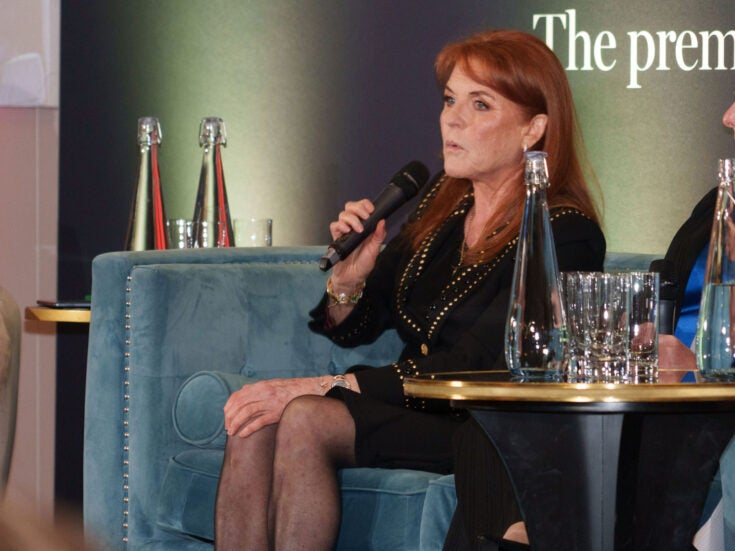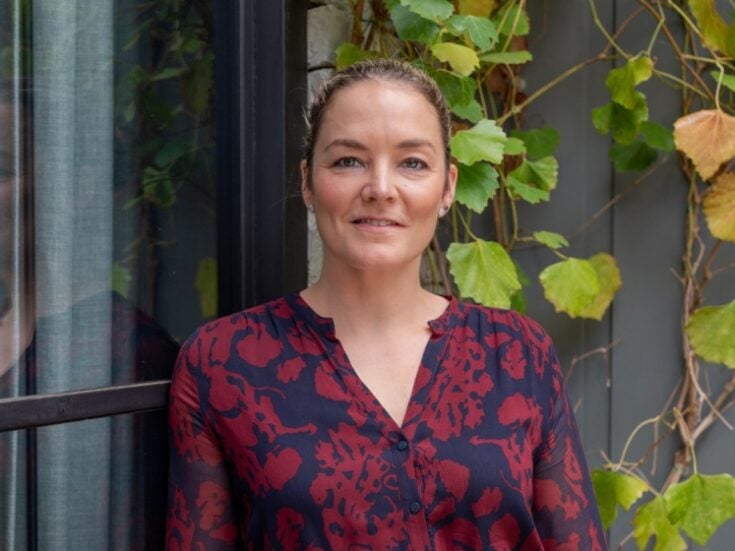
New Quids on the Quad
You shouldn’t need a first in maths from Oxford to figure out that your ancient, inadequately subsidised alma mater urgently requires the support of private donors — and that your money is as good as (almost) anyone’s, says Josh Spero
IT STARTED WITH the Led Zeppelin concert.’ Unlikelier sentences have been spoken, but probably not in Oxford.
Professor Nick Rawlins is sitting in his office overlooking Wellington Square talking about the recently announced £26 million gift to the university by Mica Ertegun, the widow of Ahmet Ertegun, Atlantic Records founder and promoter of the Rolling Stones, Aretha Franklin and the Zep. The money will endow 35 scholarships for humanities graduates at a time when the sciences, seen as more practical or valuable, receive more philanthropic funding.
£1 million from the concert at the O2 was donated to Oxford by the band and ‘that got Mica Ertegun thinking she’d like to come to Oxford. She came to Oxford and she fell in love, not just with the buildings but with the people.’ It must be rare for donors to walk through the door. ‘There are several days when no multimillionaire comes to ask me if they can help,’ he laughs.

If the multimillionaires aren’t coming to Oxford, then Oxford has to go to them. With income which doesn’t nearly meet its expenditure on teaching and research, with capital funding decapitated, with medieval buildings and 21st-century challenges, philanthropy is not just desirable but also essential. Take undergraduate education: it costs £16,000 a year for a student in the tutorial system of one-on-two classes, but fees and government support only cover £8,000. The new fees of £9,000 barely replace the teaching grants removed, and Oxford and its colleges have pledged to expand their already generous student support programmes. There is a shortfall in the undergraduate current account of £77 million this year.
Not to be too gloomy, Oxford Thinking, the university’s major fundraising campaign, has reached £1.3 billion in eight years, £50 million over target. Still, ‘without philanthropy, we would be in truly dire straits,’ Professor Rawlins says.
Across the city, Sean Rainey, head of the development office at Magdalen College, takes a longer perspective but reaches the same conclusion: ‘Philanthropy is the reason we’re here. Everything about this college is the result of philanthropy. Everything we do from having students here, having fellows teaching, the buildings we sit in, is a direct result of philanthropy. Philanthropy is all-pervasive in this institution. It’s the reason it exists and without we would struggle to survive. That’s not wishing to be melodramatic — it’s the truth.’ Like many colleges, Magdalen was founded by benefaction, in its case the gift of William of Waynflete, bishop of Winchester, in 1458.
It has to be said that it’s hard to believe Magdalen could be in quite such danger as we sit in the State Room, where members of the Senior Common Room can retire for coffee. From our finely embroidered wingback armchairs, past walls hung with French tapestries, frames holding First World War medals and a vivid Sassoferrato Virgin, we can see Magdalen’s front quad and, beyond, the quiet quad I lived off for three years, with its kempt lawn and unruly gargoyles. The reason it’s all so pretty, Rainey says, is that to keep the college — heritage site that it is — in good repair costs £1.8 million each year, over a tenth of its expenditure. It faces making losses over the next few years without a greater endowment (already one of Oxford’s biggest).

Perception is a problem, says Kirsty MacDonald, head of the development office at Wadham College. While wealthy alumni tend to be well-disposed to their old universities, ‘the downside to being Oxford or Cambridge is that people think you’ve got lots of money and the reality is that most colleges don’t.’ Wadham’s endowment provides a quarter of its turnover every year. ‘We wouldn’t survive without it,’ adds MacDonald.
THE DEVELOPMENT OVER the centuries of Oxford’s collegiate system — where the colleges provide tutorial teaching and accommodation to their students and the university the labs, lectures and facilities — has left Oxford with a structural problem: a very strong periphery and a relatively weak centre. If the university tries to infringe on collegiate autonomy, for example, by suggesting central assessments of the dons, the colleges revolt (although not quite in the manner of medieval fiefdoms that this suggests).
These tensions remain regarding philanthropy, even if both sides have come to recognise the value of co-operation. The colleges guard alumni’s details jealously so they can have first dibs on them, which means that the university generally talks to those with no connection to Oxford as potential donors: Mica Ertegun, for example, or Syrian businessmen Wafic Saïd (£70 million over time for the Saïd Business School) or Russian businessman Leonard Blavatnik (£75 million for the Blavatnik School of Government).
By working together, however, they can magnify a donor’s gift because the university can deliver ‘really big ideas’, says Professor Rawlins: a donor interested in autism ended up funding a chair in autism studies, two junior research fellowships to be held at his own college and an access fund at that college. ‘If you put those bits together, he ends up getting much more than he could have dreamed,’ just by giving to his college. Kirsty MacDonald, at the other end of the relationship, says colleges are conscious that they shouldn’t hog their alumni: ‘What you don’t want is someone saying, “Yeah, I quite liked my college, here’s £10,000,” when you know for the right project in cancer research they would give £10 million.’
A college will research its alumni’s interests so they can be invited to Oxford for events which try to rekindle the intellectual spark which took them there in the first place and which subtly emphasise the good work that needs funding. Magdalen, for example, invited twelve ex-history students to see its first edition of the King James Bible and participate in a round-table discussion about its legacy, before dinner in the president’s lodgings. Sean Rainey says they wouldn’t mention donations at an event like this, but there would be a follow-up. Other events are balder: Magdalen alumnus Niall Ferguson gave a talk in London about his new book and TV series, Civilization, and he made a pitch to the room about giving (even if his heart didn’t entirely seem in it).
Dr Paul Beckwith, who read for a DPhil in chemistry at Magdalen and used to work in financial services in New York and Hong Kong, has been giving to Magdalen, the university as a whole and other educational causes since the late Nineties; he is now one of Magdalen’s most generous donors. He credits Magdalen with providing him with the ‘skill set and approach to life’ that enabled his career. It is ‘a lot more fun and a lot more rewarding,’ he says, ‘to focus on an institution that is already excellent’: there is a guarantee of value and success.
The rate of alumnus participation in philanthropy is shockingly low: 16 per cent give to Oxford in any year. Professor Rawlins cites that positively, saying that in 2001 it was 10 per cent, and that 33 per cent of alumni have at some point given, but the idea that 84 per cent of alumni do not give is discouraging. Dr Beckwith says that people in their forties and older, who did not have to pay for their education, consequently value it less and are less inclined to give. ‘It’s not a difficult challenge,’ he says, however, ‘to show them that today and in their time and throughout the life of an Oxford college, private-sector benefactors have been hugely important.’ Attitudes are changing dramatically now, he feels.
Whereas previously the university and colleges took a more romantic approach to philanthropy — give for the sake of the students! The library! The sports pitches! — they have come to realise that would-be philanthropists are just as captured, if not more so, by hard financial realities. Kirsty MacDonald of Wadham explained to one alumnus that the new fees arrangement and bursary support will leave Wadham £100,000 worse off a year, so he agreed to contribute.

When I visited Magdalen, Sean Rainey was in the middle of a benefactors’ weekend. As well as the charm of choral evensong and lectures by fellows, there was also a frank presentation on the college finances and its development plans, which may have included mention that Magdalen was planning on launching a £50 million fundraising campaign. ‘The financial case is actually quite straightforward,’ Rainey says, ‘but we’ve never gone out and explained it properly to our alumni and increasingly we need to explain it to our students.’
THE REWARDS FOR philanthropy are, as ever, a combination of the personal and the aggrandising. Beside the satisfaction of having helped an institution in need, donors can find their names on walls, above the grandest doors and on professors (not tattooed, sadly). The New Bodleian Library was built in 1931 to Giles Gilbert Scott’s designs across the road from its 17th-century progenitor and, when it reopens in 2015 after an extensive remodelling, will be known as the Weston Library thanks to the Garfield Weston Foundation’s £25 million gift, matched by the very profitable Oxford University Press. It will be entered through the Blackwell Hall, after Julian Blackwell gave £6 million. There is also a new emphasis on having donors meet those they’ve helped: Magdalen recipients of named scholarships get to meet the namer and tell them how their studies are going, to make the gift concrete.
There are elaborate ceremonies and exclusive organisations the most munificent donors can be invited to participate in or join. For donations over £1.5 million, you may be invited to join the Chancellor’s Court of Benefactors (CCB), which has an annual meeting to discuss university matters. Donors wear voluminous maroon robes at their admission ceremony, adding the pomp to the circumstance. The current list of members is distinguished: Sir Ronald Cohen, Professor Nasser David Khalili, Michael Moritz, Dr Lisbet Rausing, Lord Weidenfeld, as well as many familiar foundations and trusts (Agnelli, Clore Duffield, Fairbairn, Linbury, Mellon, Sackler, Sutton). Intriguingly, the Greek government is listed as a donating corporation — Oxford must be hoping it doesn’t ask for a refund on its gift.

Above the CCB is the Sheldon Medal, ‘reserved for an individual benefactor who has made a strategic difference to the life of the university’, struck with the image of the donor: Michael Moritz and Harriet Heyman and Lord and Lady Sainsbury are recent recipients.
Illustrations by Femke de Jong
AS MUCH AS Oxford does need philanthropy — it costs up to £5 million to endow a threatened professorship — it is very careful from whom it takes it. The university has an independent scrutiny committee and some clear lines (no money from tobacco companies, for example), but questions of ‘clean’ and ‘dirty’ money — money from dubious sources, money with strings — always loom, especially since all sorts of donors want to bask in Oxford’s illumination.
There are enough examples of donations gone bad to make Oxford wary, not least the £1.5 million the London School of Economics accepted from Saif Gaddafi. In 2001, Philip Keevil withdrew a donation of £100,000 to Trinity College because it had rejected his son. In 2010, there were complaints that Oxford had accepted £3 million from the founder of Trafigura, the oil trading company which illegally exported toxic waste to Africa. Some were unhappy at Wafic Saïd’s donation since he worked on the UK-Saudi al-Yamamah arms deal in 1985. And few people have wanted to continue association with Rupert Murdoch, a generous benefactor to the university, endowing among other things a professorship of language and communication, although Oxford has stood by him.
But would Oxford accept money from Murdoch today? Professor Rawlins won’t be drawn. ‘You’d have to make that a hypothetical question because I’m not content with the idea. If you asked what would happen if somebody from whom we’ve accepted a donation then committed some grave criminal act, what we would do? What we would do is take the matter of the donation back to the committee that reviews donations and in the light of the evidence we now have, [we’d ask] what should we do?’ While others cut and run, Oxford awaits evidence: ‘One should not distance oneself from donors at the first ripple of concern that might be raised in the media about them. They’ve been good to us — we need to be straightforward with them as well.’ He can’t recall an instance of a donation having to be returned.
According to John Studzinksi, Mother Teresa had no such qualms: ‘She always took the view that the dirtier the money, the better because once it was in her hands, God would bless it and it would be put to good use.’ Professor Rawlins parries by citing Oxford’s reputation: ‘Our reputation is extraordinarily important to us. Reputation isn’t a mere reputation. That matters to us, would matter to my successors and would matter to whether or not your degree was something people took seriously.’ He does concede, however, that Henry VIII, who refounded Christ Church College after founder Cardinal Wolsey’s disgrace, ‘wasn’t the world’s friendliest monarch’.

The reality is that Oxford cannot afford to live up to its most idealistic students’ standards. Plenty of people would object to money coming from, say, Masters of the Universe, but too much pickiness in philanthropy leads to poverty.
SEAN RAINEY HIT upon one of the least-discussed aspects of educational philanthropy when he said, about Magdalen’s financial situation, that ‘increasingly we need to explain it to our students’. Oxford has realised that there’s little point cultivating only those who have already made money — it also needs to encourage the philanthropic impulse in its current students. While Rainey stressed that he doesn’t want to make them feel guilty about their heavily subsidised education, if they start to understand Oxford’s economics, they will be more inclined to give later on. Oxford students (if I was anything to go by) are rarely fully engaged with the world, to put it nicely, and it would shock most to discover that Oxford faces a continual financial struggle.
There is a lot Oxford can learn from America in this regard, especially given that Oxford’s aggregated endowment is £3.8 billion and Harvard’s is £20 billion. Rainey cites liberal arts college Vassar in New York State, which has Mind the Gap Day: according to its website, it ‘recognize[s] the point approximately 53 per cent of the way through the academic year when past and present gifts to the College begin paying for daily operating costs’, ie the point at which the students’ fees run out. Alumni are invited back to meet current students and explain why they gave.
An unspoken American trait is that those on scholarships give back generously afterwards to ensure a new generation can benefit. The competitive display of largess to almae matres drives American donors and most, according to Kirsty MacDonald, are happy to talk about their gifts. Dr Paul Beckwith says that because he worked in America for twenty years, he became ‘inculcated with the US model of giving back’.
A current annual activity works on both students and alumni: the telethon. Often managed by an external company, colleges pay students to call alumni, update them about the college and ask for money. Alumni are hit up, students are enlightened. But according to one person who worked on a telethon, it’s not always an enjoyable experience. Most students are not doing it out of college pride but because pay and free accommodation over the vacation are attractive or essential, and for some it can be grinding and miserable. There are, of course, those who love it — the loquacious cash-extractors.
Oxford needs to convey to all its students, however, that they have a role to play. MacDonald wants students ‘to get into some habit of giving, even if it’s £10 a year. It’s as much as anything about the habit of giving and giving back early.’ This is more important than the money itself: larger donors want to see that philanthropy is being encouraged at the grassroots and indeed have established an initiative (launching within the year) where long-term donations by young alumni are matched; the college with most participation may get a double match.
There are two key things Oxford has learnt from America, says MacDonald: philanthropy needs scale and ambition. A £1.25 billion target certainly had both of those, and the colleges are attacking the task with vigour and creativity. The purpose of all these phone calls and dinners and donations is to make Oxford secure for the future, and when Oxford talks about the future, it is not thinking of the next decade or the next generation, but of teaching the brightest students and conducting the best research and imagining world-changing ideas in perpetuity. How many places other than a university nearing the end of its first millennium can guarantee that?
Josh Spero is Spear’s editor







